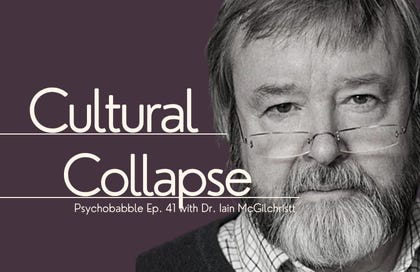In this episode of Psychobabble, I’m joined by Dr. Iain McGilchrist, a british psychiatrist, neuroscientist, Oxford literary scholar, and one of the most original thinkers of our time. Before training in medicine, Dr. McGilchrist was a Fellow of All Souls College, Oxford, specializing in English literature. He later became a consultant psychiatrist at the Maudsley and Bethlem Royal Hospitals in London. His landmark book The Master and His Emissary (2009) explores the divided brain and how left-hemisphere dominance has distorted modern culture. His recent two-volume opus The Matter With Things expands on this, challenging the metaphysical assumptions of modern science and calling for a return to embodied, value-rich ways of knowing.
In this conversation, we unpack how his hemispheric model explains today’s mental health crisis, the bureaucratic takeover of medicine, the medicalization of temperament, and why we’re diagnosing personality quirks instead of building character.
Continue the conversation with us in a more personal, dynamically visual, and free-flowing setting! In this week’s Psychobabble Insider video, we explore the cultural rise of narcissism, why so many get the treatment wrong, and what it would take to shift things at a societal level. It’s an engaging and provocative segment you won’t want to miss. Paid subscribers also get early access to Part III of the Cluster B series—available now. Upgrade to become a Psychobabble Insider and follow the links below!
How to Treat the Rise of Narcissism
In the members-only segment, we talk about the rise in narcissism, why it’s happening, how it relates to left-hemisphere dominance, and what can be done about it at a societal level. We explore what drives the different personality disorders, what therapists often get wrong about narcissists and the flaws in the current treatment approach.
How Ideological Psychiatrists Obscure the Prevalence of Cluster B
The uncomfortable truth is this: female misbehaviour, as a manifestation of Cluster B conditions, is on the rise because we’ve downplayed the importance of early envirnoment in helping emotionally volatile girls become functioning adults.

















Share this post